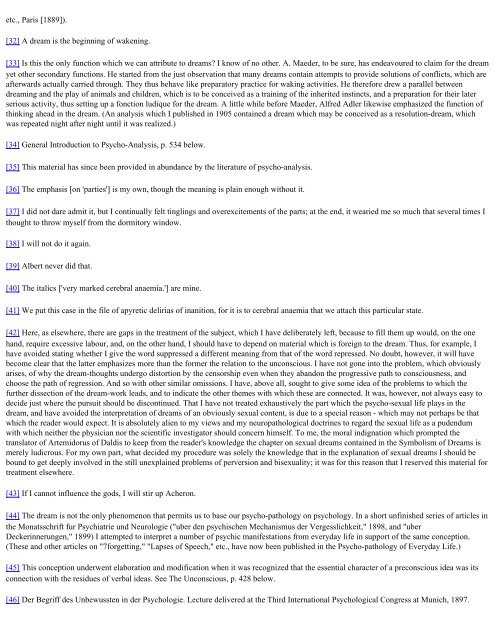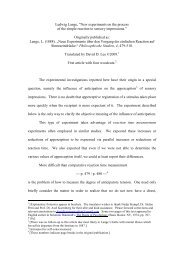The Interpretation Of Dreams Sigmund Freud (1900) PREFACE
The Interpretation Of Dreams Sigmund Freud (1900) PREFACE
The Interpretation Of Dreams Sigmund Freud (1900) PREFACE
Create successful ePaper yourself
Turn your PDF publications into a flip-book with our unique Google optimized e-Paper software.
etc., Paris [1889]).<br />
[32] A dream is the beginning of wakening.<br />
[33] Is this the only function which we can attribute to dreams? I know of no other. A. Maeder, to be sure, has endeavoured to claim for the dream<br />
yet other secondary functions. He started from the just observation that many dreams contain attempts to provide solutions of conflicts, which are<br />
afterwards actually carried through. <strong>The</strong>y thus behave like preparatory practice for waking activities. He therefore drew a parallel between<br />
dreaming and the play of animals and children, which is to be conceived as a training of the inherited instincts, and a preparation for their later<br />
serious activity, thus setting up a fonction ludique for the dream. A little while before Maeder, Alfred Adler likewise emphasized the function of<br />
thinking ahead in the dream. (An analysis which I published in 1905 contained a dream which may be conceived as a resolution-dream, which<br />
was repeated night after night until it was realized.)<br />
[34] General Introduction to Psycho-Analysis, p. 534 below.<br />
[35] This material has since been provided in abundance by the literature of psycho-analysis.<br />
[36] <strong>The</strong> emphasis [on 'parties'] is my own, though the meaning is plain enough without it.<br />
[37] I did not dare admit it, but I continually felt tinglings and overexcitements of the parts; at the end, it wearied me so much that several times I<br />
thought to throw myself from the dormitory window.<br />
[38] I will not do it again.<br />
[39] Albert never did that.<br />
[40] <strong>The</strong> italics ['very marked cerebral anaemia.'] are mine.<br />
[41] We put this case in the file of apyretic delirias of inanition, for it is to cerebral anaemia that we attach this particular state.<br />
[42] Here, as elsewhere, there are gaps in the treatment of the subject, which I have deliberately left, because to fill them up would, on the one<br />
hand, require excessive labour, and, on the other hand, I should have to depend on material which is foreign to the dream. Thus, for example, I<br />
have avoided stating whether I give the word suppressed a different meaning from that of the word repressed. No doubt, however, it will have<br />
become clear that the latter emphasizes more than the former the relation to the unconscious. I have not gone into the problem, which obviously<br />
arises, of why the dream-thoughts undergo distortion by the censorship even when they abandon the progressive path to consciousness, and<br />
choose the path of regression. And so with other similar omissions. I have, above all, sought to give some idea of the problems to which the<br />
further dissection of the dream-work leads, and to indicate the other themes with which these are connected. It was, however, not always easy to<br />
decide just where the pursuit should be discontinued. That I have not treated exhaustively the part which the psycho-sexual life plays in the<br />
dream, and have avoided the interpretation of dreams of an obviously sexual content, is due to a special reason - which may not perhaps be that<br />
which the reader would expect. It is absolutely alien to my views and my neuropathological doctrines to regard the sexual life as a pudendum<br />
with which neither the physician nor the scientific investigator should concern himself. To me, the moral indignation which prompted the<br />
translator of Artemidorus of Daldis to keep from the reader's knowledge the chapter on sexual dreams contained in the Symbolism of <strong>Dreams</strong> is<br />
merely ludicrous. For my own part, what decided my procedure was solely the knowledge that in the explanation of sexual dreams I should be<br />
bound to get deeply involved in the still unexplained problems of perversion and bisexuality; it was for this reason that I reserved this material for<br />
treatment elsewhere.<br />
[43] If I cannot influence the gods, I will stir up Acheron.<br />
[44] <strong>The</strong> dream is not the only phenomenon that permits us to base our psycho-pathology on psychology. In a short unfinished series of articles in<br />
the Monatsschrift fur Psychiatrie und Neurologie ("uber den psychischen Mechanismus der Vergesslichkeit," 1898, and "uber<br />
Deckerinnerungen," 1899) I attempted to interpret a number of psychic manifestations from everyday life in support of the same conception.<br />
(<strong>The</strong>se and other articles on "7forgetting," "Lapses of Speech," etc., have now been published in the Psycho-pathology of Everyday Life.)<br />
[45] This conception underwent elaboration and modification when it was recognized that the essential character of a preconscious idea was its<br />
connection with the residues of verbal ideas. See <strong>The</strong> Unconscious, p. 428 below.<br />
[46] Der Begriff des Unbewussten in der Psychologie. Lecture delivered at the Third International Psychological Congress at Munich, 1897.



